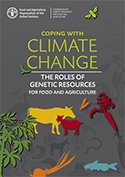Coping with Climate Change: The Roles of Genetic Resources for Food and Agriculture
Genetic resources for food and agriculture play a crucial role in food security, nutrition, and livelihoods and in the provision of environmental services. They are key components of sustainability, resilience, and adaptability in production systems. They underpin the ability of crops, livestock, aquatic organisms, and forest trees to withstand a range of harsh conditions. Thanks to their genetic diversity plants, animals and micro-organisms adapt and survive when their environments change. Climate change poses new challenges to the management of the world’s genetic resources for food and agriculture, but it also underlines their importance.
At the request of the Commission on Genetic Resources for Food and Agriculture, FAO prepared thematic studies on the interactions between climate change and plant, animal, forest, aquatic, invertebrate and micro-organism genetic resources. This publication summarizes the results of these studies.
Agriculture, fisheries, aquaculture, and forestry face the challenge of ensuring the food security of an additional 3 billion people by 2050. It has been estimated that this will require a 60 percent increase in global food production. Climate change is expected to make the task of achieving food security even more challenging, especially in the most vulnerable parts of the developing world. In these areas, in particular, adapting agriculture, fisheries, aquaculture, and forestry to the effects of climate change will be imperative for survival.














